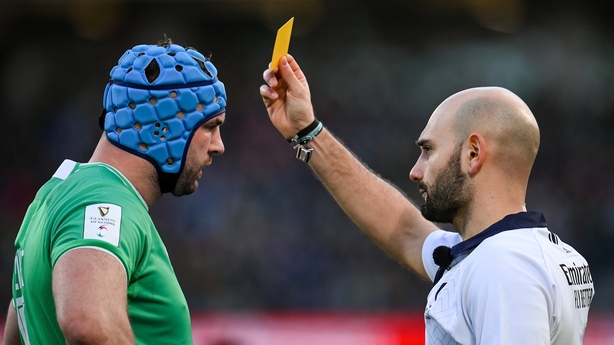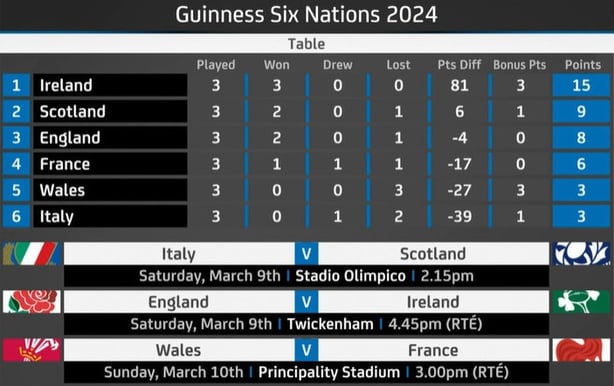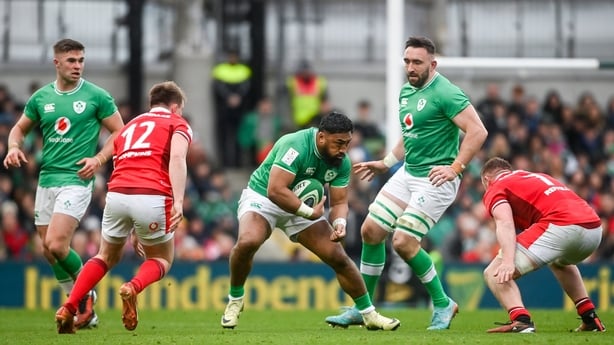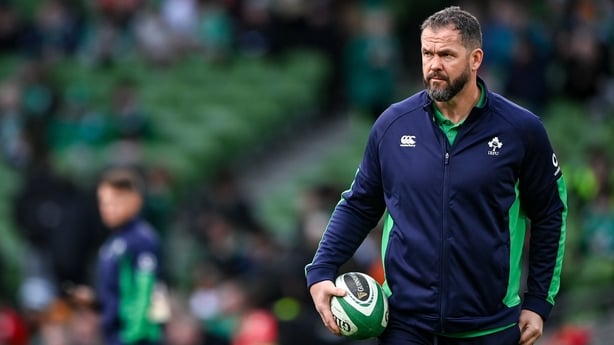While the 31-7 Guinness Six Nations win over Wales was never in doubt on Saturday, Ireland's dominance probably took them away from their usual standards and they didn’t cross for the expected bonus-point until the clock had gone over the 80-minute mark.
Andy Farrell's side will use this game as a tool to sharpen their axe. There were enough warning signs within their performance and they have small areas to work on if they want to continue their charge towards back-to-back Grand Slams, with an away trip to Twickenham on the cards next.
Ireland’s discipline wasn’t as good as they would like.
Referee Andrea Piardi was sharp on his whistle for both sides, which definitely increased the penalty count. However, Ireland won’t be happy with the entries that they afforded Wales.
Wales, by their own admission, are a team going through a huge rebuild. If Ireland gave those types of entries to a more experienced team, it may have been a different story.
Multiple times throughout the game, Ireland compounded one error or penalty with another. The only Welsh try was a penalty try, resulting in a yellow card for Tadhg Beirne, who changed his bind to affect the grounding of a probable try for Wales in the maul.

It started from a breakdown penalty that Andrew Porter gave away, poaching while Josh van der Flier was struggling to roll away. That led to another penalty from Joe McCarthy, being too eager in the counter-ruck at the breakdown and Wales finally got their reward in the resulting maul.
Wales also had a chance to close the gap to a one-score game in the second half. McCarthy gave away a penalty in the lineout, which led to Dan Sheehan being offside in the next phase of play and Wales turned down the shot at goal.
There were two moments where I thought Wales could have gone for three points.
They were 17-0 down in the first half and kicked to the corner. Going in to half-time at 17-3, the psychological aspect of getting off zero, and shifting the momentum in their favour would possibly have changed the flow of the game. They finished the game with only one score, which probably doesn’t reflect the chances they had.

The Wales defence stood up to Ireland for large parts of the game. Early on, Ireland tried to play to width with tempo and made a few errors while offloading the ball. They also used a regular play of theirs, an inside deep pass from a forward to a back, with another forward running a hard line and a second line of attackers in behind again. It often works for Ireland, however, in the early exchanges Wales had their number.
Ireland struggled at times to beat Wales over the gain line, which meant Wales could number up and read the play out the back without being short of numbers. It meant Ireland looked more lateral in attack than we have seen in quite a while. It almost looked like Ireland were uncertain as to whether they wanted to play through Wales or around them.

Ireland found gaps through Bundee Aki, Ryan Baird, Rónan Kelleher and by playing the shorter side of the breakdown.
They didn’t have it all their own way in attack however. The Six Nations holders went scoreless between James Lowe’s first-half try and Ciarán Frawley's second-half effort for more than 30 minutes of play.
While there was a well-worked try chalked off for a slight knock-on in the build-up, a 36-minute scoreless period is unlike the Andy Farrell-driven attack.
There’s no denying that Wales are an awkward team to play against. Their low-scoring, defensively natured game against England attests to that. Wales have always rushed up in defence and forced teams to play under pressure, long before South Africa changed the defensive game. It’s no surprise to see them tame Ireland for periods of the game.
Some of Frawley's actions in attack show how tightly connected the Welsh defence can be. He threw two wide passes over the top of the onrushing defence and had two cross-field kick passes in the same breath, taking seven-minute phase play. The Leinster man as expected, didn’t look out of place and stood up as the second playmaker.
While Ireland will be looking to improve upon aspects of their effectiveness, they’ll happily do so with a bonus-point victory. It’s easier to improve while winning relatively comfortably than to be forced into change on the back of a defeat. Farrell, rightly, won’t be panicking too soon.

Some of the mistakes are so easily fixed that they won’t lose much sleep over them.
There were timing issues in the delivery from a few lineouts and another timing issue from a lineout-turned-maul breakout play that Ireland regularly use as an exit play. Sheehan bursts away from the maul while backs resource the breakdown and Jamison Gibson-Park quickly puts the ball into the air. This time it was stuttering and clunky.
Don’t expect to see that the next time out.
The Welsh challenge was rudderless for periods of the game too, and was therefore too comfortable for Ireland. It was almost a curtain raiser to get used to some defensive pressure before they go to Twickenham in two weeks to take on the Felix Jones-driven, South African-based line speed defence.
It will be much more difficult to get the same dominance playing away from home against a hurting England side, following their defeat to Scotland. England have a similarly aggressive defensive line, but they are a team that started their rebuild much earlier than Ireland and could cause more trouble if Ireland don’t return to their recognisably high standards.
Ireland dominated the scrum against Wales, but England won’t be as naive and have hurt Ireland there in the past in Ireland’s last Six Nations loss against England in 2020.
It feels wrong to criticise Ireland in a 31-7, bonus-point victory. It was emphatic when it needed to be, but Wales have taken a few steps back to go forward and will be happy with large parts of their game.
If they can find a way to get faster ball through their centre partnership to feed the likes of Cameron Winnett and Rio Dyer, they’ll cause defences immeasurable trouble.
Ireland will be their own harshest critics. They’ve reached this level of cohesion and expectation through the consistency of their own behaviours. I’d expect a reaction to this game when Ireland travel to Twickenham on the next stage of their march to Six Nations victory.
Follow the RTÉ Sport WhatsApp channel for the best news, interviews, analysis and features, as well as details of our sports coverage across all RTÉ platforms.


